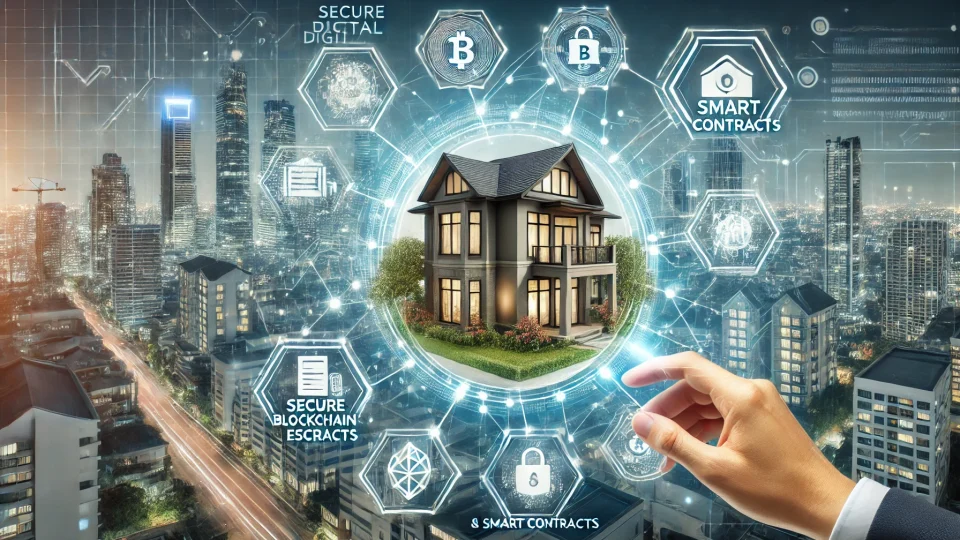
How Blockchain and Smart Contracts Are Transforming Real Estate Transactions
The real estate industry, traditionally known for its slow-moving processes and reliance on intermediaries, is undergoing a transformation. Blockchain technology, particularly through smart contracts, is revolutionizing how properties are bought and sold. These innovations promise to make transactions faster, more secure, and more cost-effective, benefiting both buyers and sellers.
What Are Smart Contracts?
Smart contracts are self-executing agreements where the terms are written directly into the code. They operate on blockchain technology, ensuring that every transaction is secure, transparent, and immutable. When specific conditions are met, the contract automatically executes the agreed-upon actions, such as transferring property ownership or releasing funds.
The Challenges in Traditional Real Estate Transactions
Currently, buying or selling property involves numerous steps and parties:
- Title searches and verification.
- Escrow services for holding funds.
- Legal reviews and document preparation.
- Payments and ownership transfers.
Each step is time-consuming and often expensive, involving lawyers, brokers, and notaries. Additionally, manual processes are prone to delays and errors, adding frustration to what should be a straightforward transaction.
How Blockchain and Smart Contracts Simplify the Process
- Eliminating Intermediaries
Smart contracts remove the need for brokers, notaries, and escrow services. Tasks like verifying ownership, holding payments, and transferring titles are automated, reducing costs and delays. - Streamlined Verification
Property ownership details, stored securely on the blockchain, are easily accessible for verification. This eliminates the need for time-consuming title searches and minimizes fraud risks. - Automated Payments and Ownership Transfers
Funds are held in a digital escrow within the smart contract. Once all predefined conditions (e.g., title verification) are met, the funds are automatically transferred to the seller, and ownership is recorded on the blockchain for the buyer. - Global Transactions Made Easy
Blockchain enables seamless cross-border real estate transactions without needing local banks or multiple intermediaries. Buyers and sellers from anywhere in the world can securely transact directly. - Cost Savings
By cutting out intermediaries and automating processes, blockchain significantly reduces transaction fees. Legal and administrative costs are also minimized, making property ownership more accessible.
Will Smart Contracts Eliminate the Need for Realtors?
One of the most significant questions surrounding the rise of smart contracts is whether they will eliminate the need for realtors. The short answer is: not entirely.
While smart contracts can automate many tasks traditionally handled by realtors, such as verifying ownership, managing escrow, and even closing deals, real estate professionals still play a crucial role in several areas:
- Market Expertise: Realtors offer in-depth knowledge of local markets, property values, and neighborhoods that cannot be replicated by a smart contract.
- Negotiation: While smart contracts can automate the transaction, realtors help negotiate the price and terms, ensuring both parties feel satisfied.
- Client Relations: Real estate professionals provide personal, human touchpoints, guiding clients through the emotional and financial aspects of buying or selling a home.
However, smart contracts may change the nature of a realtor’s job, reducing administrative tasks and allowing them to focus more on the relationship with clients and negotiation, ultimately increasing their efficiency and reducing the need for manual paperwork.
A Step-by-Step Example
Imagine buying a condo in Vancouver through a blockchain-enabled real estate platform:
- Property Listing:
The seller lists the condo, including all details like price, location, and proof of ownership, on a blockchain platform. - Agreement:
The buyer agrees to the terms, and a smart contract is created with predefined conditions (e.g., payment receipt, title verification). - Payment:
The buyer transfers funds into the smart contract’s escrow account. These funds remain locked until all conditions are met. - Verification:
The smart contract verifies the seller’s ownership and ensures compliance with local regulations. - Title Transfer:
Once all conditions are fulfilled, the smart contract transfers the title to the buyer and releases the funds to the seller. - Blockchain Update:
The transaction is recorded on the blockchain, ensuring the property’s new ownership is tamper-proof and transparent.
Real-World Examples of Blockchain in Real Estate
- Propy: A blockchain platform enabling property transactions using smart contracts. It has successfully facilitated cross-border purchases in countries like the U.S. and Ukraine.
- Ubitquity: Focuses on recording and transferring property titles securely on the blockchain.
Challenges to Adoption
While the potential is enormous, challenges remain:
- Regulatory Uncertainty: Governments need to create legal frameworks for recognizing blockchain transactions.
- Technology Adoption: Widespread use requires real estate companies and governments to adopt blockchain infrastructure.
- Consumer Awareness: Educating buyers and sellers about blockchain’s benefits is crucial for broader acceptance.
The Future of Real Estate Transactions
Blockchain technology is not just a trend—it’s a revolution that could redefine how real estate is bought and sold. By automating processes, increasing transparency, and reducing costs, blockchain empowers both buyers and sellers.
As adoption grows, platforms like Propy and Ubitquity demonstrate that the future of real estate transactions is digital, efficient, and secure. Whether you’re a tech-savvy investor or simply a homeowner looking to buy or sell, blockchain offers a glimpse into the future of property ownership.